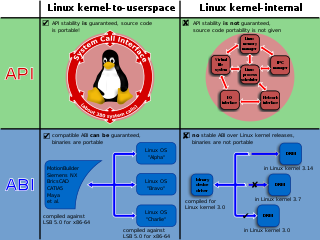The Portable Operating System Interface is a family of standards specified by the IEEE Computer Society for maintaining compatibility between operating systems. POSIX defines both the system and user-level application programming interfaces (APIs), along with command line shells and utility interfaces, for software compatibility (portability) with variants of Unix and other operating systems. POSIX is also a trademark of the IEEE. POSIX is intended to be used by both application and system developers.

In computer science, a thread of execution is the smallest sequence of programmed instructions that can be managed independently by a scheduler, which is typically a part of the operating system. In many cases, a thread is a component of a process.

In computing, a system call is the programmatic way in which a computer program requests a service from the operating system on which it is executed. This may include hardware-related services, creation and execution of new processes, and communication with integral kernel services such as process scheduling. System calls provide an essential interface between a process and the operating system.

DragonFly BSD is a free and open-source Unix-like operating system forked from FreeBSD 4.8. Matthew Dillon, an Amiga developer in the late 1980s and early 1990s and FreeBSD developer between 1994 and 2003, began working on DragonFly BSD in June 2003 and announced it on the FreeBSD mailing lists on 16 July 2003.
In computing, particularly in the context of the Unix operating system and its workalikes, fork is an operation whereby a process creates a copy of itself. It is an interface which is required for compliance with the POSIX and Single UNIX Specification standards. It is usually implemented as a C standard library wrapper to the fork, clone, or other system calls of the kernel. Fork is the primary method of process creation on Unix-like operating systems.
The C standard library or libc is the standard library for the C programming language, as specified in the ISO C standard. Starting from the original ANSI C standard, it was developed at the same time as the C library POSIX specification, which is a superset of it. Since ANSI C was adopted by the International Organization for Standardization, the C standard library is also called the ISO C library.
C dynamic memory allocation refers to performing manual memory management for dynamic memory allocation in the C programming language via a group of functions in the C standard library, namely malloc, realloc, calloc, aligned_alloc and free.
RTLinux is a hard realtime real-time operating system (RTOS) microkernel that runs the entire Linux operating system as a fully preemptive process. The hard real-time property makes it possible to control robots, data acquisition systems, manufacturing plants, and other time-sensitive instruments and machines from RTLinux applications. The design was patented. Despite the similar name, it is not related to the Real-Time Linux project of the Linux Foundation.
The Native POSIX Thread Library (NPTL) is an implementation of the POSIX Threads specification for the Linux operating system.
In computing, POSIX Threads, commonly known as pthreads, is an execution model that exists independently from a programming language, as well as a parallel execution model. It allows a program to control multiple different flows of work that overlap in time. Each flow of work is referred to as a thread, and creation and control over these flows is achieved by making calls to the POSIX Threads API. POSIX Threads is an API defined by the Institute of Electrical and Electronics Engineers (IEEE) standard POSIX.1c, Threads extensions .
In computing, a futex is a kernel system call that programmers can use to implement basic locking, or as a building block for higher-level locking abstractions such as semaphores and POSIX mutexes or condition variables.
Signals are standardized messages sent to a running program to trigger specific behavior, such as quitting or error handling. They are a limited form of inter-process communication (IPC), typically used in Unix, Unix-like, and other POSIX-compliant operating systems.
These tables provide a comparison of operating systems, of computer devices, as listing general and technical information for a number of widely used and currently available PC or handheld operating systems. The article "Usage share of operating systems" provides a broader, and more general, comparison of operating systems that includes servers, mainframes and supercomputers.
Unix-like operating systems identify a user by a value called a user identifier, often abbreviated to user ID or UID. The UID, along with the group identifier (GID) and other access control criteria, is used to determine which system resources a user can access. The password file maps textual user names to UIDs. UIDs are stored in the inodes of the Unix file system, running processes, tar archives, and the now-obsolete Network Information Service. In POSIX-compliant environments, the shell command id gives the current user's UID, as well as more information such as the user name, primary user group and group identifier (GID).

Xavier Leroy is a French computer scientist and programmer. He is best known for his role as a primary developer of the OCaml system. He is Professor of software science at Collège de France. Before his appointment at Collège de France in 2018, he was senior scientist at the French government research institution Inria.

The Linux kernel provides multiple interfaces to user-space and kernel-mode code that are used for varying purposes and that have varying properties by design. There are two types of application programming interface (API) in the Linux kernel:
- the "kernel–user space" API; and
- the "kernel internal" API.
DCEThreads is an implementation of POSIX Draft 4 threads. DCE Stands for "Distributed Computing Environment" DCEThreads allowed users to create multiple avenues of execution in a single process. It is based on pthreads interface.
In computer operating systems, a light-weight process (LWP) is a means of achieving multitasking. In the traditional meaning of the term, as used in Unix System V and Solaris, a LWP runs in user space on top of a single kernel thread and shares its address space and system resources with other LWPs within the same process. Multiple user-level threads, managed by a thread library, can be placed on top of one or many LWPs - allowing multitasking to be done at the user level, which can have some performance benefits.
ptrace is a system call found in Unix and several Unix-like operating systems. By using ptrace one process can control another, enabling the controller to inspect and manipulate the internal state of its target. ptrace is used by debuggers and other code-analysis tools, mostly as aids to software development.
Bionic is an implementation of the standard C library, developed by Google for its Android operating system. It differs from the GNU C Library (glibc) in being designed for devices with less memory and processor power than a typical Linux system. It is a combination of new code and code from FreeBSD, NetBSD, and OpenBSD released under a BSD license, rather than glibc, which uses the GNU Lesser General Public License. This difference was important in the early days of Android, when static linking was common, and is still helpful in introducing Android to software companies used to proprietary operating systems, who can be wary of the LGPL, and unclear about the differences between it and the full GNU General Public License (GPL).



